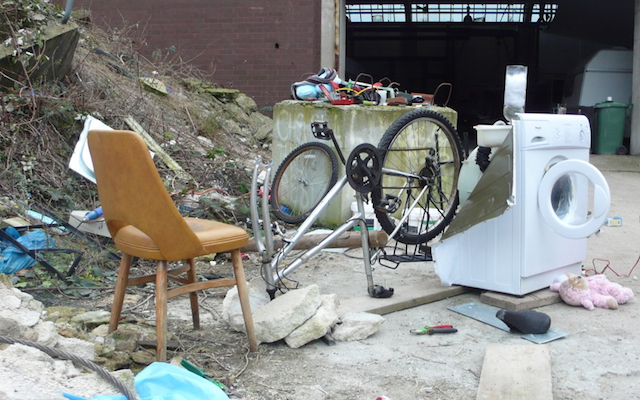
Pedal-powered washing machine – created as part of a TV demo I took part in which we tried imagine making machines from waste in post-apocalyptic Britain
My New Year’s resolution for 2015 is it to try and send as little waste to landfill as possible. (Read my end of January update). The idea popped into my mind a few weeks ago, and since then I have been thinking of more and more reasons why I should give this a go.
- Waste is such a waste – I look at piles of waste, big or small – in bins, on building sites, in front gardens – I think, wow, what a waste! It seems crazy to me that given everything we can do with modern technology we still live in such a throw-away way.
- I like a challenge
- I have actually given versions of this challenge a go, but usually only for a week, and not since starting a family, so it is time to revisit.
- Recycling is great, and there’s more of it around, but what about the stuff that can’t be recycled? Is it ok to to buy something knowing it’s going to landfill? I want to experiment with having to adopt ‘no’ as the answer to that question. What does it mean I can’t buy or do?
- I think this is something lots of people will have a view on, and I am interested to hear what they have to say.
- It’s a great chance to find out what’s in stuff, how things are made.
- Finding ingenious uses for things I don’t want to throw away.
- Experimenting with keystone habits – I read about ‘keystone habits’ in the book ‘the Power Habit’ and I don’t know it is a common term, but basically the idea that if people develop certain habits, then other habits follow suit. I’d be interested to see what other habits the habit of reducing waste develops.
- Hopefully out of all of this I can develop practical ways to reduce my waste which might be useful to other people (this reason is inspired by ‘Walden’, one of my best reads of 2014, in which one of the key themes is finding ways to develop a ‘practical philosophy for life’, which I really like).
- To challenge the status quo.
- Personal supply chain management – I put this in because I have recently been running training for corporations on sustainable supply chain management, and one of the key ideas in the training is to encourage buyers to talk to sellers about ways to reduce waste in production. Perhaps by engaging with the people I buy stuff from I can find ways to reduce waste in my ‘supply chain’.
- It is a chance to assess how compatible low-impact living is with working four-days-a-week and looking after a child. Is zero waste a full time job?
So there are the reasons. Achieving the aim is going to take some time. For starters, ‘as little waste as possible’ to landfill is not really an aim, so January is going to be a benchmarking month on the basis of which I hope to be able to set myself a reasonable target. I also need to think a bit more time to think about the parameters. Measuring kitchen waste is one thing, but what about all the waste I produce out and about, or doing my job. Hopefully come then end of January, I will have some answers.
I am looking for co-travellers on this journey, either to join me on the challenge, or just to ask me how’s it going every so often. If either appeal, I look forward to hearing from you.


Leave a Reply